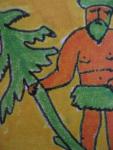 Maia Irraz, on 21 August 2012 - 01:46 PM, said:
Maia Irraz, on 21 August 2012 - 01:46 PM, said:
 Solidsnape, on 21 August 2012 - 01:30 PM, said:
Solidsnape, on 21 August 2012 - 01:30 PM, said:
I bet wheat, gluten, soya and lactose intolerance wasn't very common pre-civilisation.
Does that mean it will get more common and we're ultimately heading towards a future where all of us will be unable to consume these things like Gluten and lactose?
Are the main food groups of antiquity to become obsolete?
Bring on the Rice!!!!!
Not to sound snarky - because I also tend to think that food allergies are on the rise, though maybe not as prevalent as we'd think - but how do we know that people in pre-industrial times didn't have lactose / wheat / gluten allergies? Medical science wasn't exactly cutting-edge back then, what's to say that Mr. X's gastric troubles weren't actually caused by Coeliac's disease and not just a random illness? Coeliac's (which isn't a food allergy but an autoimmune disorder) was only properly identified at the end of the 19th century, after all, and humans have been consuming grains since the dawn of time, pretty much.
Anyway! Random aside over, I wanted to add that I checked out that site and I found it really sad. Fat shaming is nothing new but I fail to see how a site like that could motivate anyone to lose weight; to me it came off as hurtful and insulting more than anything else. Full disclosure - I've never been overweight but my parents are and my mother especially gets upset / angry when she feels like she's been targeted or made fun of. She doesn't have a thyroid condition and she doesn't overeat, her issue is that she's not active enough and she's getting older (late 60's) so losing weight is harder. She is consciously and actively trying to slim down, mostly for health reasons, and I'd be willing to bet that a site like that wouldn't help her one bit.
Yeah I know it's an auto immune disease and not an allergy, I also totally agree with what you said about science not being able to diagnose allergies at the time.
My question was, do you think that this is the case? Or not?
I don't know either way, I just found it interesting that the thread was going into evolution territory and that maybe there is some things changing in our bodies and maybe they are allergies and dietary diseases and the like.
I know that the few thousand or so years that we've been around wheat isn't an especially long time in evolutionary terms, but we've seen things evolve in a shorter time.
Maybe our digestive systems are still evolving to suit our new world/needs.
Of course, what do I know?
Anyone want some metal cut?

 Help
Help

















